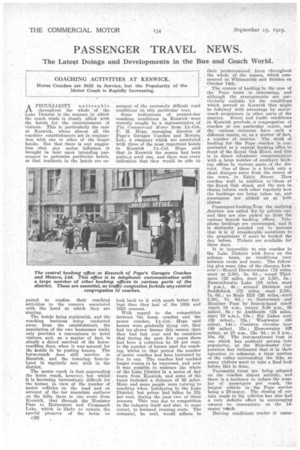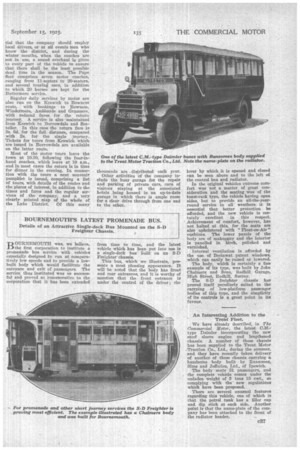PASSENGER TRAVEL NEWS.
Page 20

Page 21

If you've noticed an error in this article please click here to report it so we can fix it.
The Latest Doings and Developments in the Bus and Coach World.
• COACHING ACTIVITIES AT KESWICK.
Horse Coaches are Still in Service, but the Popularity of the Motor Coach is Rapidly Increasing.
A PECULIARITY noticeable
:throughout the whole of the Lake District is the manner in which the coach trade is closely allied with the hotels for the entertainment af visitors.This is particularly the case at Keswick, where almost all the machine establishments act in ,conjunction with one or other of the larger • hotels. Not that there is any suggestion that any undue iufluince is brought to bear upon intending passengers to patronize particular hotels, or that residents in rho hotels are ex pected to confine their coaching activities to the concern associated with the hotel at which they are staying.
The hotels being residential, and the coaching business being 2onducted away from the establishment, the association of the two businesses really only provides a convenience to hotel • visitors, and, as a matter of fact, is simply a direct survival of the horsecoaching days, when it was natural for • the hotels to be posting houses. The horse-coach does still survive in Keswick, and the towering four-inhand is regularly met with in the district.
The motor coach is fast superseding the horse coach, however, but whilst it is becoming increasingly difficult for the horses, in view of the number of motor vehicles on the road and on account of the tar macadam surfaces on the hills, there is one route from Keswick, that through the lloniater Pass to Buttermere and Crummoek ,Lake, which is likely to remain the special preserve of the horse on
account of the extremely difficult road conditions on this particular tour.
Some indications of present-day coaching conditions in Keswick were recently sought by a representative of The Commercial Motor from Lt.-Col. P. M. Hope, managing director of Pape's Garages Coaches and Motors, Ltd., a company which are associated with three of the most important hotels in Keswick Lt.-Col. Hope said that in Keswick the season had been quitaa good one, and there was every indication that they would be able to
look hack to it with much better. feelings than they had of the 1924 and 1923 seasons.
With regard to the competition between the horse coaches and the motor coaches, Lt.-Col. Hope said horses were gradually dying out, they had ten ,ifewer horses this season than they bad last year and he considers that during the past five years there had been a reduction by 60 per cent. in the number of horses used for coaching; whilst in that period the number of motor coaches had been increased by five to one. The coaches had enabled longer routes,to be traversed, and now it was possible to embrace the whole of the Lake District in a series of day tours from Keswick, and some of the tours included a distance of 95 miles. More and more people were turning to coaching when holidaying in the Lake District, but prices had fallen by 33.1e per cent, during the past two or three seasons. This was due to competition in the industry itself and also, to some extent, to lessened running costs. The company, he said, would adhere to
their predetermined fares throughout the whole of the season, which commenced at Whitsuntide and finishes on October 14th.
The system of booking in the case of the .Pape tours is interesting, and although the arrangements are particularly suitable for the conditions which prevail at Keswick they might he followed with advantage by motorcoach proprietors in other parts of the country. Street and traffic conditions in Keswick preclude :a' congregation of coaches at one particular centre, and the various concerns have each a different centre, or, as a matter of fact, a number of centres. The work of booking for the Pape coaches is concentrated at a central booking office in front of the Royal Oak Hotel, and this is in direct telephonic communication with a, large number of auxiliary booking offices in various parts,of the district. One of these is a kiosk only a short distance away from the centre of the town, in Uskin „Street. Here coaches wait in addition td those the Royal Oak stand, and the men in charge inform each other regularly how the bookings are being taken up, and passengers are picked up at both placer,
Passengers booking from the outlying districts are called for by private ear, and they are also picked up from the various branch booking offices. Telephone bookings are encouraged, and it is distinctly pointed out to patrons that it is of considerable assistance to the proprietors if seats be booked the day before. Tickets are available for three days.
It is impossible to run coaches in the Lake District with fares on the mileage basis, as conditions vary between route and route. The following give some idea of the charges, however :—Round Derwentwater (12 miles, start at 2.30), 3s. 6(1.; round Thirlmere (20 miles, start at 2.30), 5s.; Baasenthwaite Lake (15 miles, start 3 p.m.), 4s.; around Skiddaw and Saddleback (32 miles, start 2.30), 7s. ed.; to Scale Hill (26 miles,start 2,30), 7s. 6c1. ' • to Buttermere and Honister Pass by four-in-hand coach (start 10 a.m., return 5-30 p.m., 23 miles),. Sc.; to Arnhleside (34 miles, start 10 a.m.), 10s.; Silk Lakes torts
(58 12s.-; Wastwater • (06 miles), 14s.; Coniston circular tour (SO • miles), • 15s.; Hrtweswater • (68 miles), at 10 am,, 12s. 6(1.; at 2 p.m.,. 10s. 6c1: The last-mentioned tour is one which has euddeuly sprung into popularity, as the Manchester Corporation has intimated that it is their intention to submerge a large portion of the valley surrounding the lake, so many visitors want to take a final look before, this is done.
• Pneumatic tyres are being adopted on the coaches almost entirely, and there is a tendency to reduce the number of passengers per coach, • the largest vehicle , the Pape service being a 20-seater. The closing of certain roads to big vehicles has also had a very definite effect in encouraging owners to concentrate on the 14seater coach.
Driving conditions render it eesen tial that the company should employ local drivers, or at all events men who know the district, and during the winter months, when the coaches are not in use, a sound overhaul is given to every part of the vehicle to ensure that there shall be the least possible dead time in the season. The Pape fleet comprises seven motor coaches, ranging from 11-seaters to 20-seaters, and several touring cars, in addition to which 20 horses are kept for the Bnttermere service.
Regular daily services by motor are also run on the Keswick to Bowes route, with bookings to Bowness, Windermere, Ambleside and Grasmere, with reduced fares for the return journey. A service is also maintained from Keswick to Borrowdale and Seatoiler. In this case the return fare is 2s. Gd. for the full distance, compared with 2s. for the single journey. Tickets for tours from Keswick which are issued in Borrowdale are available on the latter route.
Most of the motor tours leave the town at 10.30, following the four-inhand coaches, which leave at 10 a.m., and in most cases the return is in time for dinner in the evening. In connection with the tours a neat souvenir pamphlet is issued, comprising a list of tours, with details of the routes and the places of interest, in addition to the times and fares and the regular services of the company, and a very clearly printed niap of the whole of the Lake District. Of this many thousands are distributed each year.
Other activities of the company include the busy garage for the repair and parking of private cars, cars of visiters staying at the associated hotels being housed in an up-to-date garage in which there is ample room for a clear drive through from one end to the other.






























